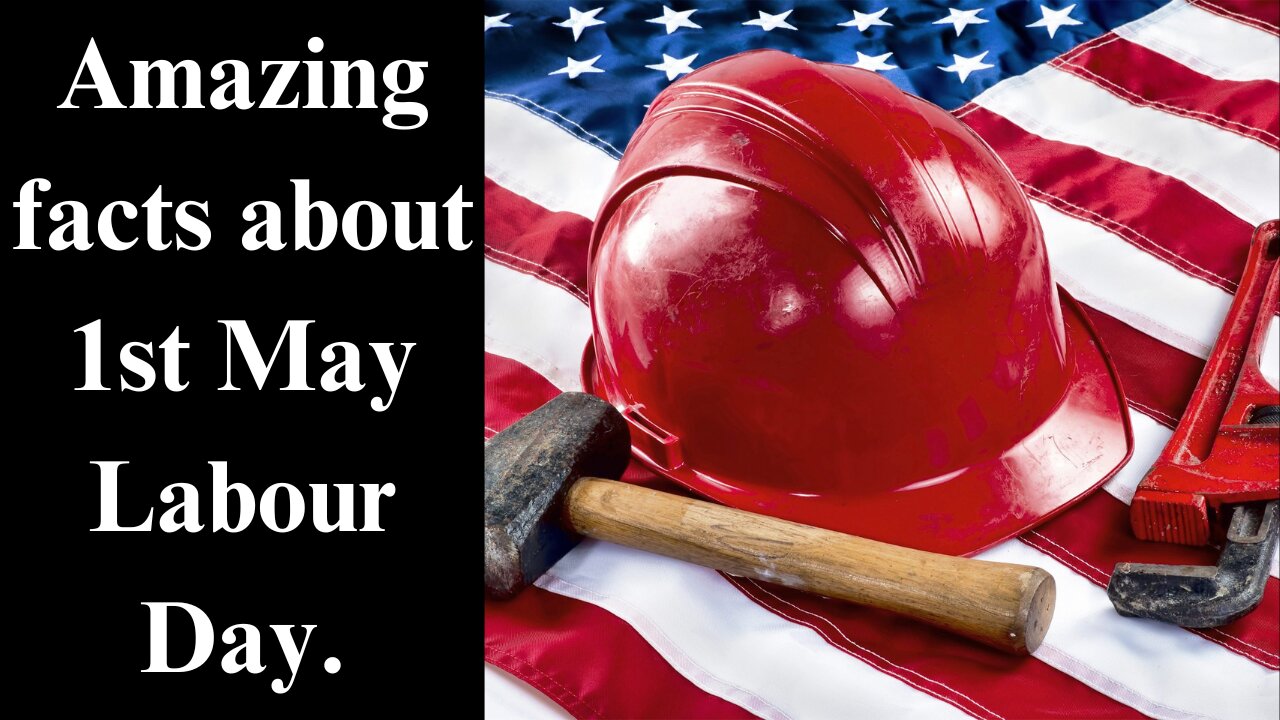Premium Only Content

laborday labourday
nternational Workers' Day, also known as Labour Day in some countries and often referred to as May Day,is a celebration of labourers and the working classes that is promoted by the international labour movement and occurs every year on 1 May, or the first Monday in May.
Traditionally, 1 May is the date of the European spring festival of May Day. In 1889, the Marxist International Socialist Congress met in Paris and established the Second International as a successor to the earlier International Workingmen's Association.
They adopted a resolution for a "great international demonstration" in support of working-class demands for the eight-hour day.
The 1 May date was chosen by the American Federation of Labor to commemorate a general strike in the United States, which had begun on 1 May 1886 and culminated in the Haymarket affair four days later. The demonstration subsequently became a yearly event.
The 1904 Sixth Conference of the Second International, called on "all Social Democratic Party organisations and trade unions of all countries to demonstrate energetically on the First of May for the legal establishment of the eight-hour day, for the class demands of the proletariat, and for universal peace".
The 1st of May, or first Monday in May, is a national public holiday in many countries, in most cases as "International Workers' Day" or a similar name. Some countries celebrate a Labour Day on other dates significant to them, such as the United States and Canada, which celebrate Labor Day on the first Monday of September.
It became a yearly commemoration, inspiring American workers to have their first stoppage.
1 May was chosen to be International Workers' Day to commemorate the 1886 Haymarket affair in Chicago.
In that year beginning on 1 May, there was a general strike for the eight-hour workday. On 4 May, the police acted to disperse a public assembly in support of the strike when an unidentified person threw a bomb.
The police responded by firing on the workers. The event led to the deaths of seven police officers and at least four civilians; sixty police officers were injured, as were one hundred and fifteen civilians.
Hundreds of labour leaders and sympathizers were later rounded-up and four were executed by hanging, after a trial that was seen as a miscarriage of justice.
The following day on 5 May, in Milwaukee, Wisconsin, the state militia fired on a crowd of strikers killing seven, including a schoolboy and a man feeding chickens in his yard.
In 1889, the first meeting of the Second International was held in Paris, following a proposal by Raymond Lavigne that called for international demonstrations on the 1890 anniversary of the Chicago protest
-
 43:27
43:27
Tucker Carlson
15 hours agoRay Dalio: America’s Hidden Civil War, and the Race to Beat China in Tech, Economics, and Academia
174K192 -
 56:56
56:56
Candace Show Podcast
15 hours agoEXCLUSIVE: Taylor Swift Will Be Deposed. | Candace Ep 150
216K161 -
 1:03:52
1:03:52
IsaacButterfield
12 hours ago $8.19 earnedRepublican Vs 25 Transgender Activists | Jewish Outrage | Lizzo Loses All the Weight
70.3K14 -
 1:10:23
1:10:23
Edge of Wonder
16 hours agoChinese Biochips Hacking Minds? Quantum Control & Journey Song Mandela Effect
89.5K9 -
 2:15:46
2:15:46
Quite Frankly
19 hours ago"Ghosts, Robotics, and OBE's" ft. Dr. Albert Taylor 2/21/25
81.3K18 -
 55:52
55:52
LFA TV
1 day agoMaking Germany Great Again | TRUMPET DAILY 2.21.25 7PM
54.2K9 -
 1:52:26
1:52:26
2 MIKES LIVE
14 hours ago2 MIKES LIVE #183 Open Mike Friday with Hannah Faulkner and Adelia Kirchner!
39.7K -
 12:09
12:09
MrBigKid
15 hours ago $3.30 earnedNew Mossberg 590R: Tactical Homestead Defender
44.3K7 -
 25:43
25:43
Degenerate Jay
20 hours ago $1.91 earnedThe Future Of Grand Theft Auto Online Looks Grim
40.2K1 -
 1:04:05
1:04:05
In The Litter Box w/ Jewels & Catturd
1 day agoYOU'RE FIRED! | In the Litter Box w/ Jewels & Catturd – Ep. 747 – 2/21/2025
120K54